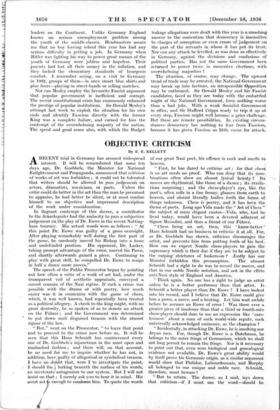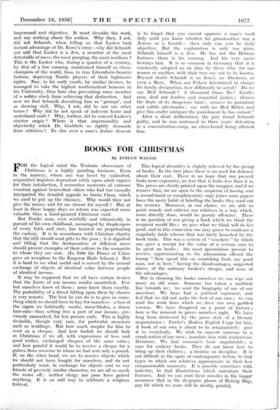OBJECTIVE CRITICISM
By E. E. KELLETT
ARECENT trial in Germany has aroused widespread interest. It will be remembered that some ten days ago, Dr. Goebbels, the Minister. for National Enlightenment and Propaganda, announced that criticism of works of art was forbidden ; it could not be tolerated that writers should be allowed to pass judgements on actors, dramatists, musicians, or poets. Unless the critic could do better in the art than the man he presumed to appraise, he had better be silent, or at most confine himself to an objective and impersonal description of the work under consideration.
In flagrant contempt of this decree, a contributor to the Schachepieler had the audacity to pass a subjective judgement on the play of Dr. Euwe in the recent Notting- ham tourney. His actual words were as follows : "At this point Dr. Euwe was guilty of a gross oversight. After playing remarkably well during, the first part of the game, he carelessly moved his Bishop into a loose and undefended position. His opponent, Dr. Lasker, taking Prompt advantage of the error, moved his Pawn, and shortly afterwards gained a piece. Continuing to play with great skill, he compelled Dr. Euwe to resign in half a dozen more moves."
The speech of the Public Prosecutor began• by pointing out how often a critic of a work of art had, under the transparent veil of aesthetic appraisals,, conveyed a covert censure of the Nazi regime. If such a crime was possible with the drama or with poetry, how much easier was it in conneicion with the game of chess, which, it was well known, had repeatedly been treated as a political allegory. A check to the king might, with no great dexterity, be so spoken of as to denote an attack on the Fiihrer ; and the Government was determined • to put down such disguised treason with the utmost rigour of the law.
"But," went on' the Prosecutor, "to leave that point and to proceed to the crime now before us. It will be seen that this Hans Schmidt has contravened every one of Dr. Goebbels's injunctions in the most open and unabashed fashion ; and there will, on that account, be no need for me to inquire whether he has not, in addition, beers'guilty of allegorical or symbolical treason. I have no d bt that, were I to investigate the point, I should fink lurking beneath the surface of his wurds, an inveterat antagonism to our system. But I will not insist on that ; I merely ask you to bear it in mind. His overt act s enough to condemn' him. To quote the words of our great Nazi poet, his offence is rank and smells to heaven.
"First, he has dared to criticise art ; for that cliesi is an art needs no proof. Who can deny that its com- binations often show an almost lyrical beauty ? Its moves are rhythmical, like those of a dance; its .reyela- tions surprising ; and the chess-player's .eye, like the poet's, often rolls in a fine frenzy, glances from earth-to heaven, and almost literally bodies forth the forms of things unknown. Chess is poetry, and it has been the theme of poets. Long ago Vida made the "Art of Chess ", the subject of some elegant cantOs—Vida, who, had he lived today, would have been a devoted adherent of Signor Mussolini, and thus a friend of our Fiihrer, .
"Chess being an art, then, this 'know-better' Hans Schmidt had no business to criticise it at all. For, as Dr. Goebbels has shown, criticism discourage § the artist, and prevents him from putting forth of his best.. How can we expect Nordic chess-players to gain the supremacy which is their due if they are to be subject to the carping strictures of lookers-on ? Justly has our Minister forbidden this presumption. The utmost Schmidt had a right to do was to record the moves, and that in our noble Nordic notation, and not in the effete anti-Nazi style of England and America.
"Think again. No one has a right to judge an artist unless he is a better performer than that artist. Is Schmidt a better player than Dr. Euwe ? I have looked into his record, and I believe that Dr. Euwe could give him a pawn, a move, and a beating. Let him wait awhile before he accuses an Euwe of error ! Was there ever a greater piece of insolence than that a third or fourth-rate chess-player should dare to use an expression like 'care- lessness' about a man of such world-wide repute, such universally acknowledged eminence, as the champion ? " Incidentally, in attacking Dr. Euwe, he is insulting our Aryan race. For, though Dr. Euwe is a Dutchman, he belongs to the outer fringe of Germanism, which we shall not long permit to remain the fringe. Nor is it necessary to point out that, even were biological and genealogical evidence not available, Dr. Euwe's great ability would by itself prove his Germanic origin, as a similar argument would show that Philidor, Labourdonnais, and Morphy all belonged to our unique and noble raee. Schmidt, therefore, must beware!
"But to return. The decree, as I said, lays down that criticism—if I must use the' word—should be impersonal and objective. It must describe the work, and say nothing about the author. Why then", I ask, did not Schmidt, when telling us that Lasker took instant advantage of Dr. Euwe's error—why did Schmidt not add that Lasker is a Jew, a member of the most detestable of races, the most grasping, the most insidious ? This is the Lasker who during a quarter of a century, by dint of a low cunning, maintained himself RS chess- champion of the world, thus, in true Liberalistic-Semitic fashion, depriving Nordic players of their legitimate rights. Nay, in his early youth, by similar devices, he managed to take the highest mathematical honours in his University, thus here also preventing some member of a nobler stock from achieving that distinction. And now we find Schmidt describing him as 'prompt', and as showing skill. Why,. I ask, did he not use other terms ? Why did he not speak of indecent haste and underhand craft ? Why, further, did he conceal Lasker's sinister origin ? Where is that impersonality and objectivity which Dr. Goebbels • so rightly demands from criticism ? To slur over a man's Judaic descent is to forget that you cannot appraise a man's work duly until you know whether his grandmother was a Jewess or a Gentile : then Only can you be truly Objective. But the explanation is only too plain. Schmidt himself is a Jew. He has not the Hebraic features—there is his cunning. And his very 'name bewrays him. It is so common in Germany that it is constantly adopted as an alias by those who, for one reason or another, wish their true one not to be known. Beyond doubt Schmidt is an Israel, an Abraham; or even a Marx. When our Fiihrer determined to change his family designation, how differently he acted ! Do we say Heil Schmidt ? A thousand times No ! Gentle- men, deal out fearless and impartial justice ; cleanse the State of its dangerous taint ; remove its persistent and subtle adversaries ; say with me Heil Hitler, and give this crafty intriguer the punishment he has earned."
After a short deliberation, the jury found Schmidt guilty, and he was sentenced to three years' detention in a concentration-camp, no che§s-board being allowed him.











































 Previous page
Previous page